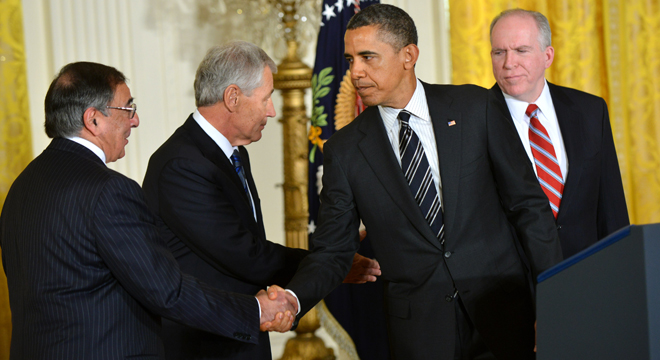In all of U.S. history, just 9 presidential nominees for cabinet positions have been rejected by the Senate. And just 12 were withdrawn before coming to a Senate vote, according to the official Senate record.
The eye-opening statistics provide context to upcoming Senate confirmation processes as President Obama seeks to reshape his cabinet for a second term, including the selection of Chuck Hagel to lead the Pentagon.
The Senate has historically granted the president broad deference on such decisions. Nominations tend not to be derailed unless ethics lapses make the candidate politically toxic, experts say.
“Most felled nominees were tripped up by personal mistakes or questionable ethics,” said Sarah Binder, a Senate expert and professor at George Washington University, pointing to John Tower, Zoë Baird, Linda Chavez and Tom Daschle. Binder says nominees, such as John Ashcroft, have been subject to opposition due to policy views but are ultimately confirmed.
The last presidential nominee to be rejected by a vote of the Senate was John Tower, George H. W. Bush’s choice to lead the Pentagon in 1989. As the Los Angeles Times reported at the time, Tower was tarnished by allegations of being “guilty of drunkenness, womanizing and sharing secret insights into U.S.-Soviet arms negotiations with defense contractors.” The Democratic-led Senate rejected him by a narrow 53-47 margin.
Tower was the first cabinet nominee to be rejected by the Senate in three decades. The 1959 rejection of Eisenhower’s nominee to be Commerce secretary, Lewis Strauss, also occurred at the hands of an overwhelmingly Democratic Senate. According to the Senate record, Strauss had had a “stormy” tenure in a previous administration job and “displayed a condescending and disdainful attitude toward members of the Senate” during his confirmation hearings.
The only other rejected cabinet nominee of the 20th century was Charles Warren in 1925.
It’s somewhat less rare for presidents to withdraw a nominee upon revelation of a character flaw that could cost political capital or endanger confirmation. Some nominees, such as Tim Geithner in 2009 (who had a series of personal income tax filing errors), overcome these troubles; others don’t.
In 2009, the newly elected Obama withdrew his nomination of Tom Daschle for Secretary of Health and Human Services after Daschle had his own tax problems. In 2004 and 2001, respectively, George W. Bush pulled his nominations of Bernard Kerik and Linda Chavez amid allegations that the candidates had personally employed illegal immigrants. Ethics lapses involving sexual misconduct, stock trades and tax fraud forced Bill Clinton to withdraw nominees Hershel Gober, Anthony Lake and Zoë Baird.
“The standard operating procedure is to find some impropriety that senators can hang a ‘no’ vote on,” said Jack Pitney, a political scientist at Claremont McKenna College. “Sometimes the impropriety has been minor (Daschle), sometimes major (Kerik went to prison).”
Prior to Clinton, the last president to pull a cabinet nominee was Lyndon Johnson.
These historical data reveal that the vast majority of candidates to lead a major department get the job after the choice is announced by the president. And unless a president voluntarily pulls the nomination prior to a vote, it’s virtually unheard of for a Senate majority that shares that president’s party to shoot down his nominee. Democrats currently have a 55-45 majority.
John Sides, a political science professor at George Washington University, argues that the GOP’s now-routine use of the filibuster alters the landscape, but he observes that previous nominees of President Obama have received Republican votes.
“The rise of the 60-vote Senate does make confirmation harder, even if most nominees are still confirmed,” Sides said. But “norms of deference to the president, as long as the nominee isn’t completely anathema, aren’t completely dead.”










